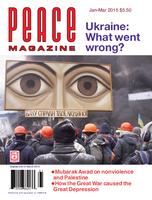
Peace Magazine Jan-Mar 2015, page 29. Some rights reserved.
Search for other articles by Jamie Swift here
by Stephen Dale. Fernwood Publishing, Halifax and Winnipeg, 111 pages, $18.95
The sharp-eyed Ottawa writer Stephen Dale has produced a short book about how boys were invited to war a hundred years ago.
Having combed over tattered archival copies of Young Canada: An Illustrated Magazine for Boys, Dale describes the way that ripping yarns of manly adventure promoted the glory of Empire, justifying bloodletting of lesser peoples in the name of Britain’s civilizing mission.
Citing Julia Briggs’s survey of pre-World War I children’s literature, Dale shows how popular magazines like Young Canada placed an overweening emphasis on heroism in the face of mortal danger. It was, explains Briggs, “as if the generation doomed to die on the battlefield had been reared with exactly the ideals needed to persuade them to volunteer as soon as they could.”
And volunteer they did, though many young Canadians who did so originated—like their eponymous magazine—in the Mother Country. A lot of young men born in Canada (and of course particularly in French Canada) initially gave the war a pass. The only thing Canadian about Young Canada was its title. The sheet was published in England.
Dale outlines Young Canada’s dominant theme: how hero-soldiers prevailed over war’s hardships by sheer individual courage .
Dale, the author of books on children and consumer culture and Greenpeace (McLuhan’s Children), adroitly shows the solid propaganda value in showing how facing down danger and an evil enemy “ennobled both the individual soldiers and the nation as a whole.”
This culture war of a century ago has eerie echoes in English Canada today. State and media efforts to sanctify soldiers (especially dead soldiers, not so much the physically and psychologically maimed) have become relentless. Highways of heroes. The militarization of commemoration. Sports events bristling with weaponry: a recent television ad urged viewers to tune in when a team of Canadian amateur hockey players would be “standing on guard” against the dastardly Russians.
The Official Story of today’s culture wars has it that we owe our freedoms—not to the bottom-up struggles of women, workers, aboriginal peoples and so many others—but to the military. This bizarre fantasy is being repeated ad nauseum. The fact is that Canada’s military has more often than not been deployed to push back against those whose ef forts would enlarge the democratic sphere—from the rebels of 1837 through Batoche in 1885 to the Mohawks of Oka in 1990.
And World War I? An imperial misadventure that cost the lives of 16 million people. Our allies? A brutally corrupt Russian monarchy that ruled by the knout and did as much as any participant to start the war. (see Christopher Clark’s magisterial The Sleepwalkers: How Europe Went to War in 1914 )
But promoting soldiers as eternal heroes—either those blown away on the Somme or in Kandahar—has an important ideological function. Public hyperbole went into overdrive last October when a reservist was murdered while doing ceremonial guard duty in Ottawa. This unfortunate crime victim was immediately cast as a hero, his killer surely a terrorist. The nation would, apparently, stand strong, on guard to defend its values.
Once we begin to accept a mythological sanctification of “the fallen,” it becomes that much trickier for Canadians to show the folly of the latest misadventures in the Middle East and East Asia. We saw this in the disaster that was Canada’s Kandahar war. Criticize the war and you risk getting tarred with the “you don’t support our troops” brush. Remember “Taliban Jack” Layton? He dared to speak of negotiation.
Stephen Dale understands this dynamic. He situates the Harper government’s warrior nation story against a romantic version of war that was peddled to boys in the years before and during WW I.
Noble Illusions locates the romantic notions of yesterday’s death frenzy in the context of today’s efforts to airbrush the killing fields of 1914-1918. He shows how the Official Story is trying to replace the “bleaker view of the war” brought home by its veterans, now long departed, with a more inspirational tale based on a “blind, unthinking patriotism that would make any future call to war easier to swallow.”
Reviewed by Kingston writer Jamie Swift, the author, most recently, of Warrior Nation: Rebranding Canada in an Age of Anxiety (with Ian McKay). Their next collaboration will be The Vimy Trap, soon to be published by Between The Lines.

Peace Magazine Jan-Mar 2015, page 29. Some rights reserved.
Search for other articles by Jamie Swift here